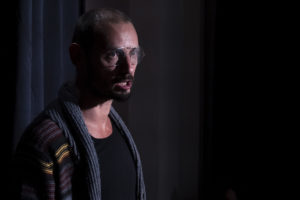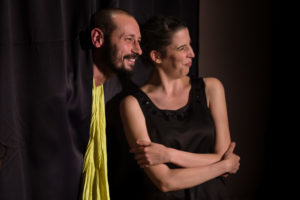Hét kérdés, hét válasz sorozatunkban ezúttal Boda Tibor felel Bán-Horváth Veronika kérdéseire.

Boda Tibor A gyáva című előadásban
A gyáva – színházi előadás premier
2022. október 23-án új színházi előadást mutat be az Itt és Most Társulat. A darabot Sarkadi Imre: A gyáva c. kisregénye nyomán Varju Nándor rendezte Szintai-Molnár Péter közreműködésével. Főszerepben Janó Anna és Boda Tibor láthatóak.
BHV: Nem vagyok benne biztos, hogy meg tudom mondani, mikor találkoztunk először, de azt tudom, hogy szabadúszó, független színházi színész/drámatanár kategóriába pakoltalak a fejemben. Triviálisnak tűnik a kérdés, de valóban érdekel a válasz: miért hiszel a független színházban?
BT: Mert az egyetlen állandó dolog az életemben. Nem tudnám definiálni magam nélküle. Ismerem, és mégis új meg új arca tárul fel minden egyes új projekttel. A kapcsolódás, a tanulás, a fejlődés területe az életemben. Megközelítőleg sem érdekel semmi más ennyire. És azért is hiszek benne, mert a társadalmi szerepvállalás, szociális felelősség sokkal kézzelfoghatóbb a keretein belül, mint a kőszínházi struktúrában.
BHV: 2022-ben egy alapvetően improvizációs színházi előadásokkal foglalkozó társulattól, az Itt és Mosttól kaptál felkérést egy hagyományos színházi előadás férfi szerepeire. Korábban milyen módon kapcsolódtál az improvizációhoz? Az Itt és Most Társulattal hogyan és mikor kerültél kapcsolatba?
BT: Az improvizációhoz való kapcsolódás legkézenfekvőbb oldala számomra az inárcsi KB35 Társulat, ahol az elődásaink létrehozásában igen gyakran alkalmaztuk a módszert. Nem egy előadásunk született ilyen technikával (József Krisztina ügye, Reális esély, Életben ragadtak, Tikk, P – avagy, jelenetek egy vándorszínész életéből.) Az Itt és Most Társulattal pedig Varju Nándin keresztül kerültem kapcsolatba, akit már jó 10-15 éve ismerek diákszínjátszó koromból. Ezúton köszönet, hogy rám gondolt a feladattal kapcsolatban.
BHV: Mik voltak az első benyomásaid Sarkadi Imre: A gyáva c. kisregénye kapcsán?
BT: Van egy olyan félig-meddig diagnosztizált jelenség nálam, hogy gyakran nem látom meg első olvasásra a lehetőséget az anyagokban, amiket nem én választottam… Ez esetben is így történt, de miután ezzel a fogyatékosságommal valamelyest tisztában vagyok, nem igyekeztem olyan nagyon a kétségeimnek hangot adni, viszont lett bennem egy plusz kíváncsiság arra nézve, mit hozunk ki a dramatizált, húzott szövegből. A próbák, elemzések, ötletelések közben aztán persze annak rendje és módja szerint feltárultak számomra is a mélyebb régiók, a visszatérő motívumok, többletjelentések és a szimbólumok. Ilyenek a szobor, a vihar, az autóval száguldozás motívumai, ami mind közelebb vitt minket a bátorság kontra gyávaság kérdésköréhez, ami eredetileg foglalkoztatta Nándit.
BHV: Három karaktert is játszol ebben az előadásban. Ezek a férfiak más módon, de mind a központi szereplő, Éva hatása alatt állnak, aki szintén függő viszonyban van velünk. Miben hasonlítanak és miben különböznek ezek a figurák?
BT: Mindenképpen hasonlítanak abban, hogy kölcsönösen fenntartják a függőségi viszonyt egymás felé. Egyik karakter számára sem opció az egyedüllét, sem rövid, sem hosszútávon. Egytől egyig magányosak, és mindent megtennének azért, hogy a tátongó űrt így vagy úgy, de betömjék a másikkal. A különbség pedig talán az, hogy a tekintélyelvű, nőket megcímkéző, és szűkre szabott szerepkörökbe kényszerítő patriarchális társadalomban, a főhősnő függetlenségre és szabadságra való reális lehetőségei relativizálódnak, és reményeink szerint vita lehetőségét hordozzák magukban, melyet szándékunkban áll kiaknázni.
BHV: Úgy tudom, partnereddel, az Évát megformáló Janó Annával ez az első közös színészi munkátok, és Nándival és Petivel sem dolgoztál még együtt ebben a formában, az októberi premier ezért is különleges. Milyen volt a közös próbafolyamat?
BT: Ez akár áttetsző, kötelező jellegű reklámszöveg is lehetne, de pont nem érdekel, mert esetünkben úgy éreztem igaz: Olyan volt, mint kés a vajban! Mintha nem először dolgoztunk volna együtt. Nándi abszolút nyitott volt az ötletekre, véleményekre, hovatovább el is várta, hogy bedobáljuk azokat. Úgy alakították kvázi egyenrangú alkotótársak az anyagot, ahogyan az a független színházi próbafolyamatokban számomra megszokott és természetes. Ahogy értelme van ezt véleményem szerint csinálni. Erről beszéltem fentebb. Az egymás felé tanúsított bizalom és kíváncsiság kellett is, mert az idő – mint már oly sokszor máskor – finoman szólva sem állt korlátlanul rendelkezésünkre…
BHV: Minden olyan mű, aminek befogadásával minőségi időt töltünk el, hatással van ránk. Interpretációval, alkotással foglalkozva úgy tapasztalom, hogy a belső utazások újabb és újabb önismereti élményeket jelentenek. Neked A gyáva – akár a mű, akár a próbafolyamat – milyen személyes kérdéseket vetett fel?
BT: Hálistennek’ elég követhetően és plasztikusan, mégsem kategorikusan pedzegeti az anyag az egyik kedvelt vesszőparipám kérdéskörét: a szabadság mibenlétét, önnön határaim átlépésének lehetségességét. A kiegyensúlyozott egyedüllét vs. folyamatos viszonyrendszerek kereszttüzében létezés kontrasztját helyezi a fókuszba, mindezt leginkább egy szerelmi viszonyon keresztül, ismerősen, mégsem pusztán közhelyek mentén.
BHV: Mi a kedvenc mondatod az előadásból?
BT: “Most elkedvetlenítettél evvel a szoborkritikáddal!”

Itt és Most Társulat “A gyáva” című előadásból egy pillanat. A képen Janó Anna és Boda Tibor látható.
Az előadás a Nemzeti Kulturális Alap támogatásával jött létre.
Jegyváltás: https://ittesmosttarsulat.jegy.hu/program/a-gyava-140294/883988
Sarkadi Imre örököseinek engedélyét a HOFRA Kft. közvetítette.
Köszönöm a beszélgetést Boda Tibornak.
